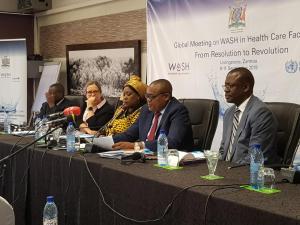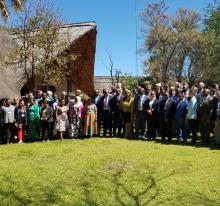Zambia hosts major global conference on water, sanitation and hygiene in health care facilities
More than 90 international delegates representing 22 countries are gathering in Livingstone, Zambia, this week for a three-day global meeting to improve access to water, sanitation and hygiene (WASH) services in hospitals and health centres.
Globally, an estimated 896 million people use health care facilities lacking water services and 1.5 billion use facilities with no sanitation services. More than 1 million deaths each year are associated with births in unsanitary conditions and infections account for 26 per cent of neonatal deaths and 11 per cent of maternal mortality.
“In health care facilities, lack of WASH is very devastating,” said the Minister of Health in Zambia, Hon. Dr. Chitalu Chilufya. “In maternity settings, the situation is often worse, putting mothers and babies at high risk of deadly infections leading to death and morbidity.”
Earlier this year, the World Health Assembly approved a vision in which every health care facility has functional WASH services and practices that enable essential, quality health services for everyone, everywhere. The World Health Organisation (WHO) and UNICEF are now coordinating global efforts to ensure all health facilities have WASH services. Countries are being encouraged to lead their own initiatives and to improve the monitoring of progress on targets. The Sustainable Development Goals (SDGs) place increased emphasis on universal health coverage, including access to WASH services in health care facilities.
According to WHO and UNICEF in 2015, nearly 40 per cent of health facilities lacked water, while 19 per cent were without adequate sanitation and 35 per cent didn’t have materials for hand hygiene. More than 40 per cent did not safely manage health care waste.
"It is saddening but all too common to find health facilities lacking such basic services such as a water supply and handwashing facilities,” said United Nations Resident Coordinator in Zambia, Dr Coumba Mar Gadio. “This isn’t acceptable in the 21st century and makes it much more likely that people visiting hospital will pick up an infection.”
About the World Health Organisation
The work of WHO affects the lives of every person on this planet. From the food we eat and the water we drink, to the safety of medicines we take and prevention and control of diseases. We aim to provide every child, woman, and man with the best chance to lead a long, healthy and fulfilled life.
About UNICEF
UNICEF promotes the rights and wellbeing of every child, in everything we do. Together with our partners, we work in 190 countries and territories to translate that commitment into practical action, focusing special effort on reaching the most vulnerable and excluded children, to the benefit of all children, everywhere.
For more information about UNICEF Zambia and its work for children, visit www.unicef.org/zambia Follow UNICEF Zambia on Twitter, Facebook and Instagram.




